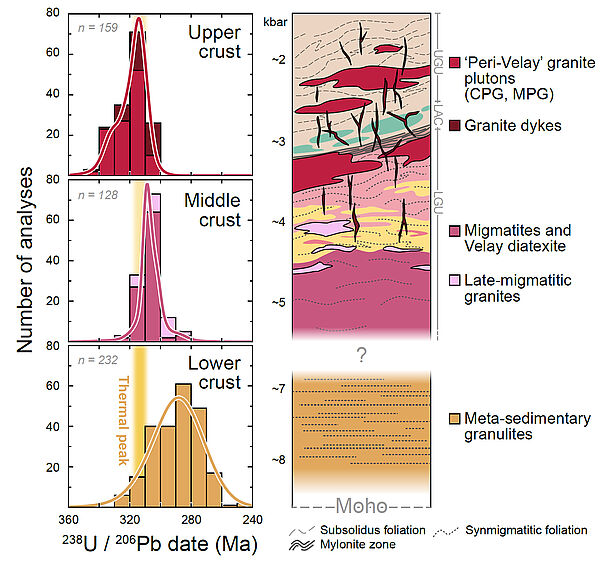Lower crustal ultra-high temperature (UHT) metamorphism and the resulting production of granitic magmas in convergent orogens represent key processes of intracrustal differentiation. The mechanisms and timescales of these phenomena are yet still debated. The Variscan orogenic crust of the eastern French Massif Central was affected by one such major differentiation event in the Carboniferous. A comparison of data from upper- and mid-crustal granites/migmatites with recently obtained zircon petrochronological results on deeply sourced granulite xenoliths from the Velay area reveals that this event results from extensive UHT metamorphism in the lower crust, at conditions up to 940–970 °C and 6–10 kbar. Both meta-sedimentary and meta-igneous crustal rocks were affected by partial melting, but the former have produced and lost more melt along the prograde path and at peak conditions, explaining the dominantly peraluminous composition of granites. Decoupling of zircon ages in the granites (340–310 Ma), migmatites (320–300 Ma) and granulites (310–265 Ma) sets strong constraints on the mechanisms and timescales of magma production and transfer at the crustal scale. Prograde melting in the lower crust and melt extraction to form granites lasted about ~27 Myr following an abrupt increase of the heat flux at the Moho after lithospheric mantle delamination; it was followed by slow cooling over nearly 50 Myr in the presence of melt. These results provide a direct assessment of the mechanisms and timescales of crustal differentiation; and validate the granulite-granite connection in the framework of the melt loss theory in migmatitic systems.
SEMINAIRE M. LAURENT Oscar
À la uneÉvénement passé
Séminaire
8
juin 2023
SALLE DU CONSEIL-13HOO


